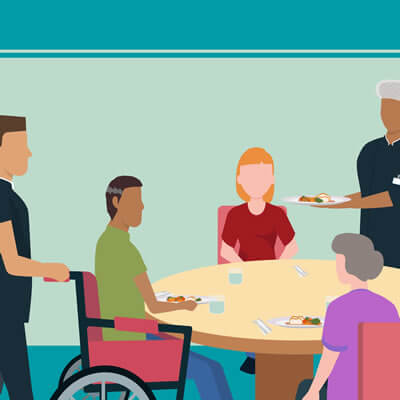All about Allergens for Residential Care
About this course

This course is designed to assist staff preparing and serving food, or supervising mealtimes and food related activities, to gain knowledge about food allergies and follow best practice procedures for making their service safer for residents with food allergy.
Who this course is for
This course is for cooks and chefs and other kitchen staff, service managers and supervisors, nurses, allied health professionals, and carers working in various care sectors and settings including:
- Residential aged care, nursing homes and other residential care
- Transitional care, respite care, same day care, low care
- Rehabilitation care including mental health, disability, drug and
alcohol
- Group and residential homes, boarding houses
- Quarantine facilities and services
- Correctional and detention facilities
- Community hospices
- Delivered meals organisations
- Defence force bases
- Onshore and offshore mine sites
- Other overnight, short and long stay facilities
*Staff working in hospitals and hospices with joint food service with a hospital should complete one of the All about Allergens for Hospitals courses
*Staff working in children’s education and care services should complete All about Allergens for Children’s education and care
*Staff working in camps should complete All about Allergens for Camps
Course modules and learning outcomes
There are six units in this All about Allergens course.
There are five compulsory units which cover aspects of food allergen management that everyone in the organisation should understand.
Unit 1: Food allergy overview (compulsory)
- Understand food allergy and the consequences of serving the wrong food to a resident with food allergy.
- Know the difference between a food allergy, a food intolerance and coeliac disease.
- Be able to list the common food allergens in Australia.
- Recognise symptoms of an allergic reaction and the actions to take.
Unit 2: Roles, responsibilities and communication (compulsory)
- Understand what the law states about providing food to residents with food allergy.
- Understand the responsibilities of the resident with food allergy or their carer, care staff and the food service department.
- Know how to effectively communicate with staff about a resident’s food allergy and food order.
- Understand how to report incidents related to food allergy.
Unit 3: Menus and food labels (compulsory)
- Understand food labelling laws in Australia for packaged and unpackaged foods.
- Demonstrate knowledge of reading food labels and identifying food allergens on a label.
- Be able to identify food allergens in products, packaged foods, recipes, condiments and garnishes.
- Understand Precautionary Allergen Labelling statements and what these mean for residents with food allergy.
- Learn about the strategies to use to know exactly what is in the food you serve.
Unit 4: Practical management of food allergy in the kitchen (compulsory)
- Describe methods used during food preparation that minimise the risk of an allergic reaction.
- Recognise and manage areas of possible cross contamination in food service.
- Identify common mistakes made during food preparation that can make foods unsafe for residents with food allergy.
Unit 5: Practical management of food allergy at the point of service (compulsory)
- Describe strategies food businesses can use to make sure that the right meal or drink is served to the right resident with food allergy.
- Identify the different ways that residents access food and strategies to improve safety for residents with food allergy.
The sixth unit is optional and provides supplementary information for managerial and other high level operational staff or decision makers and dietitians responsible for the organisation’s overall allergen management, policies and procedures, quality assurance programs and emergency management procedures.
Unit 6: Managing food allergies in your organisation (optional)
- Apply tools to adopt best practice procedures for food allergen management at an organisational level.
- Apply risk management strategies to minimise the risk of residents eating a food they are allergic to.
- Understand staff roles and responsibilities and the requirement for staff education and training in food allergen management.
Learning outcomes are assessed with short end of unit quizzes and a longer final assessment.
Course length
This course takes approximately 1.5 - 2 hours to complete.
Your progress is saved along the way, so you can stop and come back to the course at any time. It is recommended you complete the course within 2 weeks.
How often to undertake this course
You should undertake this training at least every 2 years.
Latest version
All about Allergens for Residential Care (released 7 August 2022)
To start this course Register or enrol
